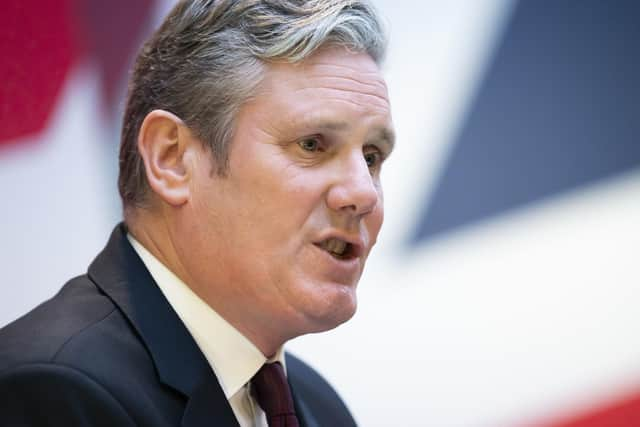'I won't take Yorkshire votes for granted,' says Starmer as Labour prepares for a general election
In an exclusive interview with The Yorkshire Post in Barnsley, the Labour leader set out his vision for the county, which included investing in industry, devolution, and a promise that he will not take Yorkshire votes for granted like previous party leaders.
“We are the party of actual practical measures for levelling up, not empty slogans,” said Sir Keir.
Advertisement
Hide AdAdvertisement
Hide Ad“Levelling up was always an empty slogan for the Tories, they've now abandoned it.”


Labour’s position on levelling up and growth is centred around green energy, partly spearheaded by the former leader and Yorkshire MP, Ed Miliband.
Following the announcement of a publicly-owned energy company, Great British Energy, and a national wealth fund, the aim is to bring back industrial jobs to the former heartlands in Yorkshire and the North East which abandoned the party since the New Labour years.
In addition, the party has set out that it will abolish business rates, which it argues is damaging to independent and local businesses on the highstreet competing with digital giants like Amazon.
Advertisement
Hide AdAdvertisement
Hide AdThe Labour leader said that his approach was inspired by speaking to Yorkshire companies he met at The Yorkshire Post’s awards for the Fastest 50 growing companies four years ago.
The party’s relentless pro-business language, such as Sir Keir insistence that Labour will be a “partner” for businesses and provide stability, has borne fruit in recent weeks.
On Sunday the chairman of Tesco said Labour was the “only team on the field” in British politics as he backed its plans for growth, something unimaginable under Jeremy Corbyn only three years ago.
Sir Keir said that much of the work in government will not be done from Number 10, but through devolution deals which would push power and decision making “away from Whitehall to Yorkshire”.
Advertisement
Hide AdAdvertisement
Hide Ad“I want as many decisions taken locally as possible, and therefore I think that the people of Yorkshire know what's best for Yorkshire,” he said.
The Labour leader also suggested that he could support a One Yorkshire devolution deal, which has been a pipedream for many in the region, with power divided up among mayors, rather than delivering for over 5 million people.
“We will listen to what Yorkshire wants, we’ll look at the configuration,” he said.
As Labour gears up for a general election, Sir Keir said that his party was now preparing further policies in its manifesto as the “Government could fall at any moment”.
Advertisement
Hide AdAdvertisement
Hide AdIt is understood that the party will set out proposals to strengthen the Office for Budget Responsibility, following the panicked reaction of the markets when Kwasi Kwarteng published his tax-plan without economic forecasts.
“We will be saying more about the OBR, because as you've seen from the last few weeks, economic stability is hugely important,” said Sir Keir.
The Labour leader said that his party would also be making more of its offer on housing and on workers’ rights, with the Trade Union Congress (TUC) starting tomorrow.
Despite the party’s readiness for government, the Conservatives still control when the next election will be held, with Sir Keir set to be 62 when the polls are next due to open.
Advertisement
Hide AdAdvertisement
Hide AdIf he wins, he will be the oldest first-term prime minister since James Callaghan, and would be 67 after a full 5-year-term, when he could theoretically pick up his state pension.
The Labour leader admitted that devolution, tackling climate change, building up new industry and green energy is not a quick job
However, with recent polling suggesting that Labour could achieve a majority as high as 350 seats at the next election, the party could well be eyeing more than 10 years in power before the Conservatives are ready to take back the keys to Downing Street.
When asked if he sees himself as a one-term prime minister, or if he is in this for the long-haul, Sir Keir told the Yorkshire Post: “I want to be the next prime minister, I'm into this for the long term, I know it will take time.”
Advertisement
Hide AdAdvertisement
Hide AdHowever, he added that he felt that his policy platform was one that could be implemented as soon as he was in Downing Street.
“We don't need to wait five years for that, we can do that from the start,” he said.
Central to his plan is Rachel Reeves, his shadow chancellor, who, in just over a year after taking over the role from Anneliese Dodds, has become the Labour leader’s closest political ally.
This is the big difference that you’ve got,” he said.
“Liz Truss now and Jeremy Hunt are poles apart. With Rachel and me, you've got the two of us working hand in hand the whole time.
Advertisement
Hide AdAdvertisement
Hide Ad“Her office has now been moved up right next to my office. We integrate our staff, we work together. “
He said that they as a pair were “as close, if not closer than Blair and Brown” who swept Labour to victory in 1997.
Labour’s new-found New Labour-esque confidence came following the party’s conference only weeks ago.
“We have changed,” he said, adding: “That's not caution or hesitancy, it’s being humble enough to recognise that our party needed to change.
Advertisement
Hide AdAdvertisement
Hide Ad“The lighthouse beam only comes around so often to an opposition party. It came around on to us in the last few weeks and months and it illuminated a party which has changed, which is ready, which has got the answers to the challenges the country is facing.”
Despite this, he said that he is “not complacent” and that in Yorkshire “we have to earn every vote”
“I lived in Yorkshire for three years. My wife's mother came from Doncaster, I know Yorkshire very well.
“We have to earn those votes, not take anything for granted.”